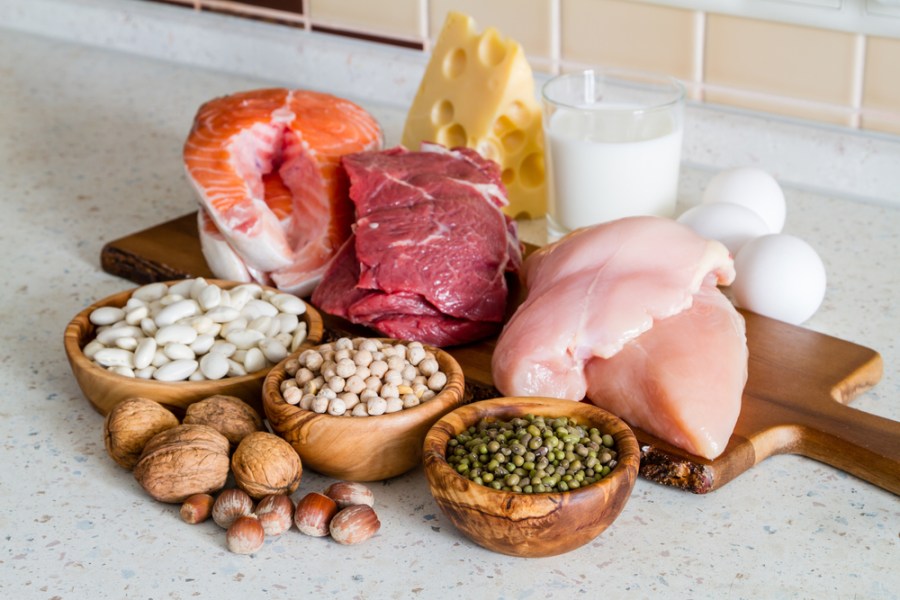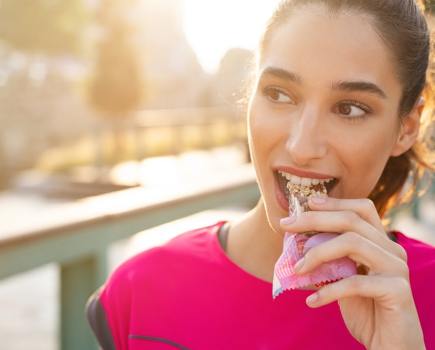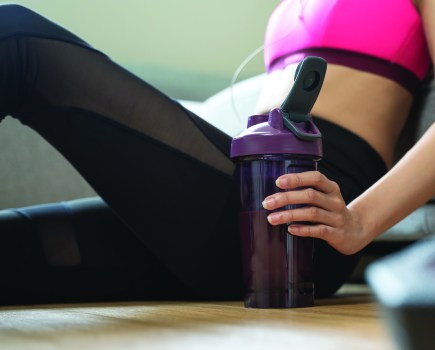Science shows us that good nutrition helps athletes recover from a run, ride, injury or illness. Here the experts reveal exactly which foods will fix you. Rob Kemp finds out more.
Perceived wisdom throughout the fitness world has preached that a proper portion of protein only consumed within a short window of opportunity immediately after a tough training session is the most effectively builds muscle. In short, if you miss that optimal slot then the post-workout protein powder really isn’t hitting the spot.
As a result of this athletes of all standards have chugged down shakes at that optimum moment 0-60 minutes after a gruelling workout. But then Brad Schoenfeld, an associate professor in exercise science, presented game-changing research to the Academy of Nutrition and Dietetics’ annual Food and Nutrition Conference and Expo in October 2019.
In a nutshell Brad’s measurements of exercise, protein intake and body composition – using ultrasound and dual X-ray absorptiometry imaging – smashed the ‘window of opportunity’ theory. He revealed that the best time to eat protein for effective muscle repair is… anytime! That’s right – it can be as far away from the workout itself as four to six hours, either side of the session, and still be as good at rebuilding muscle. ‘If you’re eating protein at breakfast, lunch, and dinner and having snacks in between, you’re going to hit your window,’ he told his peers.
This research has triggered further studies and sent shockwaves through the world of performance nutrition. But it’s also highlighted how it’s not so much about when you eat, as what you eat that will restore your body to winning form.
With this in mind here are the best foods for…
Fixing Muscle
When it comes to the right ingredients for muscle repair after a tough training session, the consensus of expert opinion is still high-quality dietary protein, especially lean protein and milk (Fluid based dairy foods also digest and absorb quickly which increases this effect). ‘When you eat protein it breaks down into amino acids which stimulates the mTOR pathway – and that leads to muscle protein synthesis,’ explains Holly Dempsey, dietician at the Centre for Health & Human Performance (chhp.com). ‘After exercise, dairy based protein (whey) is superior to other proteins due to its high level of the amino acid leucine.’
According to Dr Warren Bradley, Head of Nutrition at goalmasterfitness.com it’s the foods that can reduce inflammation which will help speed-up recovery after any muscle tears or pulls though. ‘These include foods high in antioxidants such as oily fish, berries, garlic, broccoli, dark green leafy veg, colourful veg in general, walnuts, ginger, turmeric, cinnamon and chillies.’
Repairing Bones
When you’re rebuilding your way back from a break or fracture injury Dempsey suggests that good overall nutritional intake is essential. ‘Deficiencies in energy and macronutrients and micronutrients can impair bone recovery,’ she warns. ‘Breaks and fractures often lead to longer term immobilisation and reduced activity – that in turn results in a reduction in muscle mass, strength and function. There’s evidence that muscle tissue can be lost within 36 hours of inactivity.’
About 50 per cent of bones are made up of protein. Dempsey recommends; ‘Calcium from milk, cheese, yoghurts and fish with bones – plus vitamin D supplements. Vitamin C is vital too. Collagen is protein and a key building block for the bones and vitamin C helps the body make collagen so eat plenty of citrus fruits, kiwi, berries, potatoes and peppers.’
Overcoming Overtraining
‘It’s possible to engage in tough exercise causing extreme fatigue – and food can aid recovery,’ says Dr Bradley. He suggests that foods containing the full amino acid profile – that is all of the essential amino acids required for muscle growth that cannot be produced by the body itself will help here. ‘That includes milk, eggs (very high bioavailability), yoghurt (high protein like SKYR or quark), chicken, beef, fish, tofu.’
Other foods such as beans, quinoa, hemp, nuts and seeds contain protein, but in lower absolute quantities. In the event of persistent fatigue and your food choices not having the restorative impact you’re after the experts suggest you upscale your approach. ‘Recovery between training sessions helps prevent overtraining – with attention paid to carbohydrate and protein intake – although how much is dependent on the individual’s size, sport and training plan,’ adds Holly Dempsey. ‘A sports dietitian can help build personalised dietary plans to aid recovery.’
Fighting Infection
‘There’s good evidence that a balanced, varied diet which meets both macronutrient (carbs, protein and fats) and micronutrient requirements (particularly vitamin D and antioxidants) can optimise your immune system,’ says Dempsey. Specifically she suggests vitamin D, found in egg yolks, liver, oily fish and fortified spreads. ‘In the UK we recommend that from September to April everybody takes a 10mcg vitamin D supplement.’ Athletes doing a very high amount and intensity of exercise tend to have more coughs and colds due to impaired immune cell function. ‘Those doing a high level of training may wish to get their vitamin D levels checked and even investigate higher supplementation.’
Vitamin C has long been championed as a flu fighter. ‘There is some evidence that a vitamin C supplement (0.25-1g/day) in heavy exercisers may reduce the upper respiratory tract infections,’ says Dempsey. Natural sources include citrus fruits, potatoes, berries, kiwis and tomatoes. ‘But some studies have found that high dose vitamin C may blunt exercise adaptations in those already well-trained. In short, more research is needed.’ There’s also evidence that a daily dose of 1010 live bacteria helps to reduce the number of upper respiratory tract infections and shortens the average number of ill days. But for probiotics to be effective Dempsey says a healthy gut needs around 30g of fibre a day too.
Easing Anxiety
‘There’s evolving evidence that foods containing tryptophan, melatonin, B-vitamins and magnesium can help us sleep,’ says Dempsey. ‘Tryptophan increases serotonin levels – and low levels of serotonin have been linked with insomnia. Melatonin, a hormone which helps regulate your sleep/wake cycle, can be sourced from foods too.’
Among the foods Dempsey recommends for athletes struggling to get sufficient shuteye in the build-up to a big race are B vitamins and Magnesium which help tryptophan be more available in the body, as well as nuts, cottage cheese, milk, tart cherry juice, whole cherries and kiwi fruit. ‘The ritual of having a warming drink before bed e.g. milk or caffeine-free tea may also aid sleep,’ she adds. ’Anxiety before an event can lead to gastro related symptoms and athletes often eating find low-fibre foods, simple carbs or those low in fermentable carbs (FODMAP foods) before competition can reduce these symptoms which can impact performance.’
Combating Cramps
Since an imbalance in hydration and electrolytes is one of the chief suspects in the reasons why we get cramps it would make sense that getting plenty of fluids inside you before, during and after a workout can reduce the risk of you cramping up. ‘Foods or drinks containing sodium can help retain fluid and aid rehydration,’ suggests Dempsey. ‘Use your urine as a guide to your hydration status – any darker than a pale, straw coloured yellow then you need to rehydrate.’
‘With delayed onset muscle soreness (DOMs) some studies exploring creatine, Omega-3 supplementation and tart cherries have shown reduced symptoms or enhanced recovery,’ says Dempsey. ‘Also a modest number of studies have shown that 50-100g protein during the recovery period leads to accelerated recovery and therefore no lack in performance during DOMs – but in both cases other studies have shown no benefit and in the case of taking 100g of protein in practicality is probably not realistic.’







